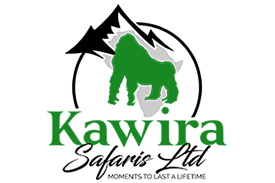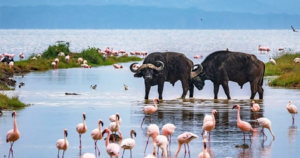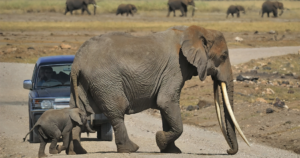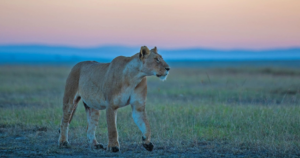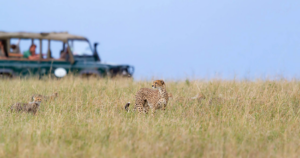24 days Best of Uganda Safari
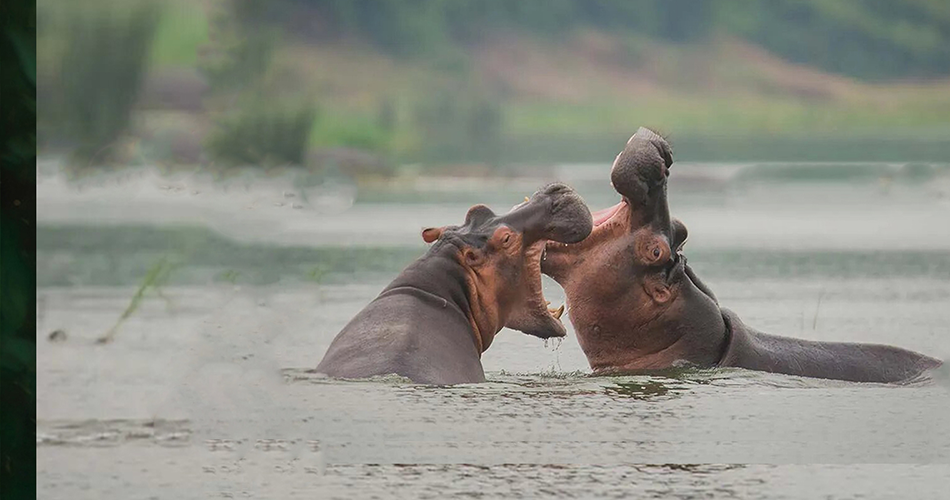
Overview
Full Itinerary
Day 1:Fly to Entebbe, Uganda
You depart today for your overnight flight from home to Entebbe, Uganda.
Meals
LunchDinner
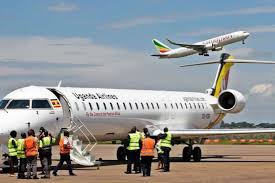
Day 2:Arrival in Entebbe, Uganda
Upon arrival in Entebbe, Uganda, our representative will meet you at the airport and escort you to your hotel in Kampala via minibus—a transfer of about 1.5 to 2 hours, depending on traffic.
Upon arrival, you will check in and receive your room assignment. Depending on where we stay, we’ll likely be located at a hotel situated atop one of Kampala’s famous seven hills. Typical amenities include a restaurant, swimming pool, and a rooftop bar with sweeping views of the city; rooms are likely to feature air conditioning, satellite TV, minibar, wireless Internet, and private bath with hair dryer.
Main Destination: Entebbe International Airport (Airport/Airstrip)
Meals
BreakfastLunch
Dinner
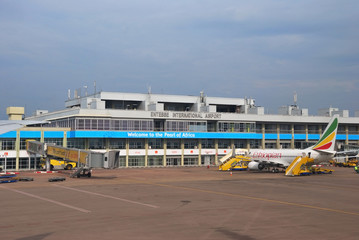
Day 3:Explore Kampala • Visit Kabaka's Mengo Palace • Discuss controversial president Idi Amin
At about 10am, we’ll gather for a Welcome Briefing in the hotel, where we can introduce ourselves and meet our Extension Guide. We will also review our itinerary in more detail (including any changes that may need to occur). Our Extension Guide will also discuss logistics, safety and emergency procedures, and answer any questions we may have. We'll also take a short orientation walk of the area before returning to our hotel.
Then around 10:30am, we’ll take a 1-hour bus ride to visit Kabaka’s Mengo Palace, the official residence of the King of the Kingdom of Buganda. Here, we’ll discover an underground prison built by General-turned-President Idi Amin in the 1970s. Amin is a controversial figure in Uganda: Older citizens who lived through his brutal eight-year reign remember him as a savage dictator who massacred as many as 500,000 civilians, destroyed the economy, and supported terrorists. However, younger generations consider him a nationalist and a hero. We'll discuss this disconnect in detail, and we'll spend about an hour touring the palace grounds to learn about other local leaders. Afterward, we'll take a 5-minute ride to a nearby restaurant.
Lunch: At a local restaurant around 1pm, featuring regional cuisine.
At about 2pm we'll take a 5-minute drive into the heart of Kampala to continue our discoveries of Uganda's bustling capital, which is home to more than 1.6 million people. We'll get a feel for daily life when we visit the central bus station, where tuk-tuks and public buses zig and zag among tens of thousands of commuters. We'll also stop at a local food market, where we'll witness an assortment of local produce, meats, and dry goods. After about 1.5 hours to explore, we'll take another short drive back to our hotel, arriving by around 3:30pm. Then, you're free to explore more of the area on your own, relax in your room, or take advantage of the hotel’s facilities. We'll regroup back in the lobby at 6:30pm for a 15-minute drive to a local restaurant.
At a local restaurant around 6:45pm, featuring regional cuisine.
Meals
BreakfastLunch
Dinner
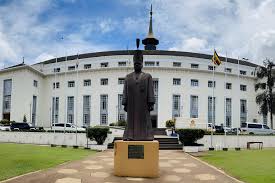
Day 4:Visit Mabamba swamp and transfer to Jinja Town
After breakfast you will head to Mabamba Swamp located on Lake Victoria. It is a large tract of marshlands with various channels through it which provides the perfect habitat for countless water birds. Keep your eyes open for the Shoebill Stork and web toed Sitatunga Antelopes. Later you will drive to Jinja. Overnight at The Haven lodge overlooking the rapids on River Nile.
Main Destination: Mabamba Swamp (Area)
Meals
BreakfastLunch
Dinner
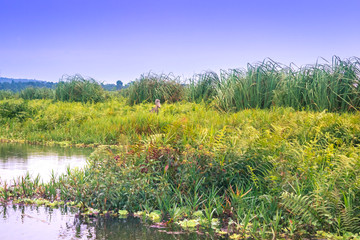
Day 5:Boat ride to the source of the Nile
In the morning after breakfast, you will have a boat ride to the Source of the Nile. There after you will have a city tour of Jinja town. Jinja is the second largest and industrial capital of Uganda. You may visit local markets or some industries. In the afternoon you start your journey to Kapchorwa home to the magnificent Sipi falls. You will camp overnight at Sipi falls lodge.
Main Destination: Nile River (River)
Meals
BreakfastLunch
Dinner
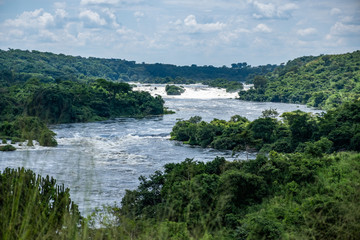
Day 6:Sipi Falls hike and coffee community walk
ou shall have a nature walk to the Sipi falls. These are a series of 3 waterfalls. You shall walk to the base of the falls and relax while taking a dip in the cool water of the falls, located at the base of Mt Elgon. In the afternoon you will go for a coffee community walk. The Sipi Falls area, found at the base of Mount Elgon is particularly famous for Bugisu Arabica Coffee produced and grown by the Local farmers. Bugisu Arabica only grows at an altitude of between 1,600 and 1,900 metres; it is the main cash crop in the area and genuinely one of the finest coffee's in the world. You will again Camp overnight at Sipi falls resort.
Meals
BreakfastLunch
Dinner
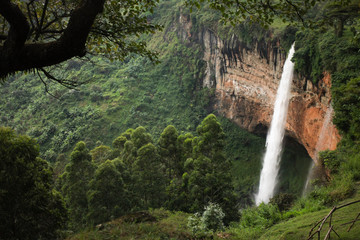
Day 7:Drive to Moroto via Nyero rock paintings
Today after breakfast you will drive to Moroto town. Along the way you will visit the Nyero rock paintings. They comprise of a three-tiered rock shelter with primitive paintings on the inner surface that dates back to the Iron Age. In Kitgum, you will pitch camp relax and enjoy the beautiful and quiet ambiance at Moroto Hotel
Meals
BreakfastLunch
Dinner
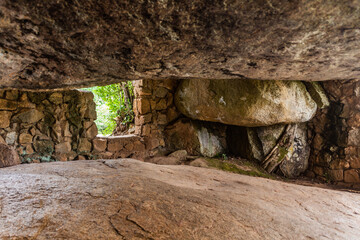
Day 8:Drive to Kidepo National Park and game drive
You will drive to Kidepo National Park with a packed lunch. Upon arrival you will set up camp inside the park and thereafter embark on an evening Game drive. The Park lies in the rugged, semi arid valleys between Uganda’s borders with Sudan and Kenya, some 700km from Kampala. It has a profusion of big game and hosts over 77 mammal species as well as around 475 bird species. Kidepo is Uganda’s most isolated national park, but the few who make the long journey north agree that it is also the most magnificent, and ranks among Africa’s finest wildernesses.
Meals
BreakfastLunch
Dinner
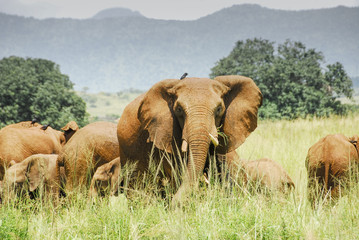
Day 9:You will drive to Kidepo National Park with a packed lunch. Upon arrival you will set up camp inside the park and thereafter embark on an evening Game drive. The Park lies in the rugged, semi arid valleys between Uganda’s borders with Sudan and Kenya, some 700km from Kampala. It has a profusion of big game and hosts over 77 mammal species as well as around 475 bird species. Kidepo is Uganda’s most isolated national park, but the few who make the long journey north agree that it is also the most magnificent, and ranks among Africa’s finest wildernesses.
After your breakfast, start your drive through the Narus Valley where you will have a nature walk to the Hot springs. In the afternoon, you will enjoy another game drive Kidepo National Park is a savannah landscape that extends in all directions. It is home to elephant, zebra, giraffe, huge herds of buffalo, warthog, duiker, Jackson’s Hartebeest, lion, leopard, cheetah and hundreds of bird species. Afterwards you will retire to your campsite.
Meals
BreakfastLunch
Dinner
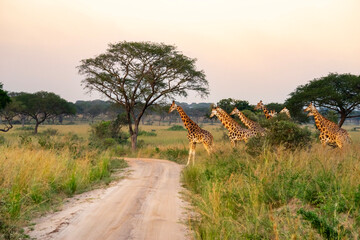
Day 10:Morning game drive and community visit
After an early morning breakfast, embark on a morning game that will take you through the park to see herds of buffaloes, elephants, giraffes, zebras and hopefully some lions, leopard and the elusive cheetah. This will also enable you to be in full sight of varieties of birds as well.
You will rest until evening where you will go for a cultural tour in the Karimojong community. Here you will spend a wonderful evening with Karamajong people and have an insight of their way of life and beliefs. At the end of the tour you will be able to understand why their pride makes them slow to adapt to globalization.
Meals
BreakfastLunch
Dinner
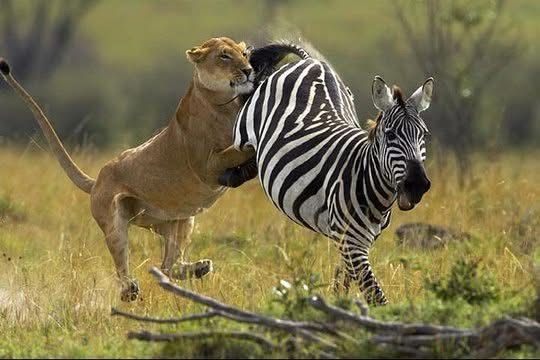
Day 11:Drive to Murchison falls national park and game drive
After breakfast you shall drive south west to Murchison Falls National Park, Uganda’s biggest National Park. You shall have a stop in Gulu town to purchase some items then proceed to the national Park. The Nile Delta has the biggest concentration of wildlife in the park. After identifying your camping ground and setting up camp you will go for an evening Game drive in the park.
Meals
BreakfastLunch
Dinner
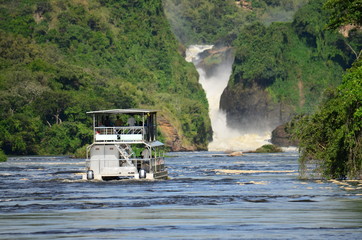
Day 12:Full day game drives
After an early breakfast, proceed for a game drive. This is a beautiful drive across savannah, Borassus Palm Forest and grassland down to Lake Albert where the Albert Nile heads north. Drive in the open African savanna in search for Lions, Leopard, Hyena, Buffalo, Elephant, Jackson Hartebeest. Oribi, Waterbucks, Uganda Kobs, and enjoy spotting various Bird species such as the Secretary Bird, Black Chested Snake Eagle, Tawny and Marshal Eagles Carmine and Swallow-Tailed Bee-Eaters and many more. In the evening, you will have another game drive to catch another glimpse of the animals.
Meals
BreakfastLunch
Dinner
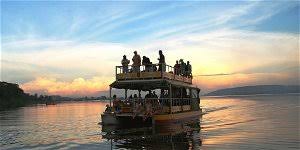
Day 13:Boat rides to the Nile Delta and to Murchison waterfalls
After an early breakfast, you will have boat ride to the Nile delta; keep a look out for a variety of bird species especially the Shoebill Stork. After lunch you will go for a boat ride up the Nile, to Murchison falls, where the park derives its name. You will hike to the top where you will experience the deafening roar of the falls.
Meals
BreakfastLunch
Dinner
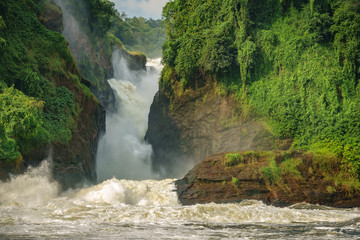
Day 14:Drive to Kibale National park
Today you will drive to Fort Portal to Kibale National Park. Along the way you will stop by a tea plantation if time permits. You will stop in Fort portal town to do shopping and there after proceed to Kibale Forest national park. You will pitch camp inside the park.
Meals
BreakfastLunch
Dinner
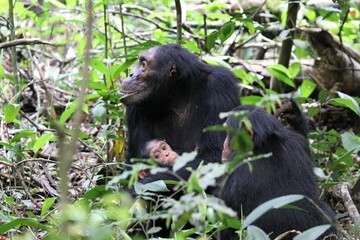
Day 15:Chimpanzee tracking and Bigodi swamp walk
Today you will track the most famous inhabitants of Kibale National Park, the chimpanzees. With over 1,450 individuals protected within the park, Kibale forest is home to the largest number of the endangered chimpanzees in Uganda, as well as the threatened red colobus monkey and the rare L’Hoest’s monkey. The forest has one of the highest diversity and density of primates in Africa totaling 13 species. In the afternoon after tracking, you have the opportunity for a guided walk through the swamps of Bigodi swamps.
Meals
BreakfastLunch
Dinner
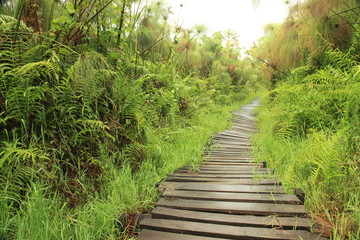
Day 16:Drive to Queen Elizabeth National park
Today you will drive to the world-famous Queen Elizabeth National Park, passing the equator along the way. You will visit the Katwe Salt Lake and see how the lacal extract rock salt. This is a major economic activity in this area. You will proceed to the park and have an evening game drive. You will also camp overnight inside the park.
Meals
BreakfastLunch
Dinner
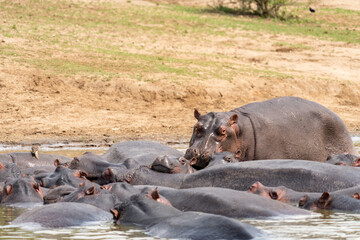
Day 17:Game drive and boat ride on the Kazinga channel
Have an Early Morning Game Drive. There are over 100 mammal species that include Lions, Hippos, Buffaloes, Leopard, Spotted Hyena, Elephants and the elusive Giant Forest Hog in this park. The Primates include Chimps, Black and White Colobus Monkeys, Blue, Black faced Red Colobus, and Red tailed monkeys and Olive Baboons. In the afternoon, you shall have a boat ride on Kazinga Channel. Queen Elizabeth boasts one of the highest bio diversity ratings of any game park, from the open Savannah to Rain Forest, dense Papyrus Swamps and Crater Lakes to the vastness of Lake Edward.
Meals
BreakfastLunch
Dinner
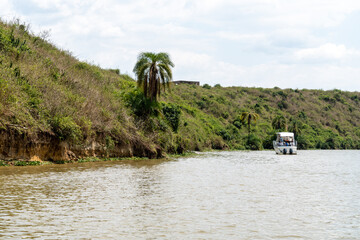
Day 18:Drive to Ishasha sector and game drive
After breakfast you will drive to Ishasha, the southern part of Queen Elizabeth National Park. In Ishasha you will have a game drive in search of the unique tree-climbing lions. Only here the lions have the habit of climbing the trees. You will also camp in this magnificent wilderness.
Main Destination: Ishasha Sector (Queen Elizabeth NP)
Meals
BreakfastLunch
Dinner
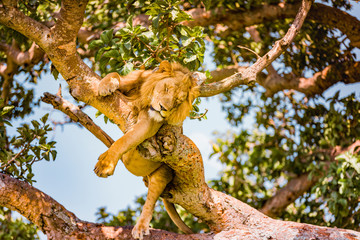
Day 19:Game drive and drive to Bwindi national park
After breakfast you will have a morning game drive in Ishasha discovering other hiding spots that the tree climbing lions enjoy. Afterwards you will proceed to Bwindi Impenetrable National Park. The park is home to the endangered mountain gorillas. This fascinating mountain forest hosts chimpanzees and spectacular birds. You shall camp at Buhoma community camp and rest in preparation for gorilla trekking.
Meals
BreakfastLunch
Dinner
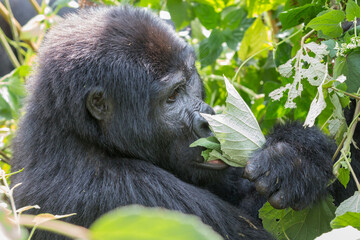
Day 20:Gorilla trekking and drive to Lake Bunyonyi
This morning you will get up very early for gorilla trekking. Trekking the Mountain Gorilla is one of the most exciting wildlife experiences on earth. The trek will take between 2 and 6 hours, but is well worth the effort. You will be led by an experienced ranger who will tell you interesting facts about flora and fauna and the lifestyle of the Gorillas. After trekking you will drive to Lake Bunyonyi where you will camp overnight at Akaawe campsite.
Meals
BreakfastLunch
Dinner
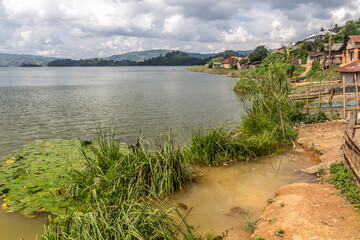
Day 21:Relaxing at Lake Bunyonyi
You shall have an exciting boat ride on Lake Bunyonyi. In the afternoon you may have optional activities; a Canoe boat ride, a swim in the Bilharzia free lake, you may also explore a nearby village. Residents are happy for your visit and are open to explain their daily lives.
Main Destination: Lake Bunyonyi (Lake)
Meals
BreakfastLunch
Dinner
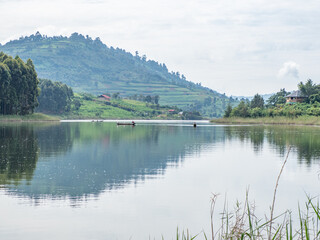
Day 22:Drive to Lake Mburo National park and game drive
After breakfast you shall drive to Lake Mburo National Park. Even at the entrance to the park you can watch impalas and zebras. Have a game drive as you enter the park. The Lake Mburo National Park forms a mosaic-like habitat with rocks, dry slopes, open and wooded savannas, forests, and swamps increases. This diversity of habitats has the diversity of bird life with 313 bird species recorded in the park, including flame head Barbet, Long-tailed Zitting Cisticola (Tabora), African Bins Rail, Collared Barbet, binding Bush singer among others. You will also camp inside the park.
Main Destination: Lake Mburo National Park
Meals
BreakfastLunch
Dinner
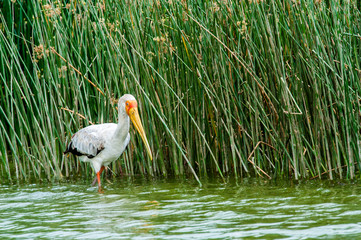
Day 23:Whole day Banyankole Culture Exploration
Morning breakfast at 0630 hrs and connect to the Enyemebwa centre to catch up with the herds men getting up to do the milking and their daily routine. You arrive and get the milking equipment including the tying rope and the milking pot to actively participate in the traditional hand milking of the Ankole long horned cattle, from milking you participate in sick animal treating, caring for cows like brushing their body using the locally made fiber brush (Enkuyo) and set out to graze in the wilderness. You enjoy the stimulating sounds that are made by the herds men as they set out to the grazing field and be mesmerized by the cows know how to align themselves forming a line headed by those that have special character of leading others. You retreat back and visit the traditional hut where you find the women churning milk in the churning gourd, from here the guide can take you to explore the crop bit of it exploring the extensive banana plantations where you learn about various banana types and their respective use participate in pruning and weeding using local methods and then participate in initial arrangements for traditional lunch.
You take a break from that and rush to the well with red soil that is used for smearing the soil made water trough, smear the trough and fill it with water and then wait for the cattle to come and water them accordingly. You can opt to have a bull slaughtered and grilled traditionally for you where you can also have it alongside the delicious local sauce that is made without fire called Eshabwe. Join the women as they clean milk pots and smoking them with the help of handmade of ceramic and specially chosen tree and grass Species, making crafts and calf pen arrangement. In the evening after the cows have settle in their Kraal, you attend to the traditional performances including citations, dancing and singing. It is a whole day encounter that allows you to gain a deep immersion of the local culture.
Main Destination: Lake Mburo National Park
Meals
BreakfastLunch
Dinner
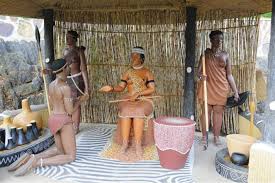
Day 24:Nature walk and departure
Early in the morning have a guided nature walk, return to the camp for a hearty breakfast. After, you will start your journey back to Entebbe. Cross the equator and have time to take photos at the equator. Buy a few souvenirs and have a quick picnic lunch. Later you depart for the Airport and take your flight back home.
Main Destination: Entebbe International Airport (Airport/Airstrip)
Accommodation: No accommodation (End of tour)
Meals & Drinks: Breakfast & lunch (Dinner not included) Drinking water (Other drinks not included)
Meals
BreakfastLunch
Dinner


Tour Details
What You Should Know Before Traveling
1. Visas and Entry Requirements
- Visa Requirements: Ensure you have a valid passport with at least six months of validity. Most East African countries (Rwanda, Uganda, Kenya, Tanzania) require a visa for international travelers. You can apply for a single-entry visa or the East African Tourist Visa, which allows travel between Rwanda, Uganda, and Kenya on a single visa.
- Visa on Arrival: Some nationalities can obtain visas on arrival, but it's best to apply in advance for convenience.
- Entry Health Requirements: A Yellow Fever vaccination certificate is mandatory for entry into Rwanda and most neighboring countries.
2. Vaccinations and Health Precautions
- Required Vaccinations: In addition to Yellow Fever, it’s recommended to be up-to-date with routine vaccines such as Hepatitis A & B, Typhoid, and Tetanus.
- Malaria Precaution: Malaria is prevalent in many areas of East Africa. Travelers are advised to take anti-malarial medication and use insect repellent with DEET, especially in rural areas.
- COVID-19 Guidelines: Ensure you check the latest COVID-19 travel restrictions and vaccine requirements, which may vary from country to country. Always carry a mask and sanitizer.
3. Safety and Security
- General Safety: Rwanda, Uganda, Kenya, and Tanzania are generally safe for tourists, but it's important to stay vigilant. Avoid displaying valuables, and always travel with your guide or tour group.
- Wildlife Safety: When participating in safaris, always follow your guide’s instructions. Keep a safe distance from animals and never leave the vehicle unless instructed.
- Health Insurance: Make sure you have comprehensive travel insurance that covers medical emergencies, evacuation, and activities like gorilla trekking or safaris.
4. Packing List
- Clothing: Pack lightweight, breathable clothing for daytime activities, and warm layers for cooler nights, especially in high-altitude areas like Rwanda’s Volcanoes National Park.
- Footwear: Comfortable hiking boots are essential for trekking, while sandals or casual shoes work well for city exploration.
- Rain Gear: A waterproof jacket and pants are recommended, especially during the rainy season (March-May and October-November).
- Sun Protection: Bring sunscreen, a hat, and sunglasses. The sun can be intense, particularly at higher elevations.
- Insect Repellent: Essential for protecting against mosquito bites, especially in the evenings.
5. Weather and Best Travel Times
- Rwanda and Uganda: The best time for gorilla trekking is during the dry seasons, from December to February and June to September. Expect cool mornings and evenings, with pleasant daytime temperatures.
- Kenya and Tanzania: The best time for safaris is from June to October, during the dry season, when animals gather around water sources, making wildlife viewing easier.
- Packing for the Seasons: Dry season (June–October) is great for wildlife viewing, while the rainy seasons (March-May, October-November) bring lush landscapes but may make some roads impassable.
6. Currency and Money Matters
- Local Currency: Rwanda uses the Rwandan Franc (RWF), Uganda uses the Ugandan Shilling (UGX), Kenya the Kenyan Shilling (KES), and Tanzania the Tanzanian Shilling (TZS).
- Foreign Currency: U.S. Dollars are widely accepted, especially for larger payments like park fees and accommodations. However, smaller transactions should be made in local currency.
- ATMs and Credit Cards: ATMs are available in major cities, but it’s advisable to carry cash, especially when traveling to rural areas. Credit cards may not be widely accepted outside major hotels.
7. Cultural Etiquette and Customs
- Respecting Local Culture: East African countries are rich in diverse cultures and traditions. Be respectful of local customs, dress modestly when visiting rural areas, and always ask before taking photos of people.
- Language: English is widely spoken in Rwanda, Uganda, Kenya, and Tanzania, though Swahili is a common regional language. Learning a few basic phrases in Swahili or Kinyarwanda can enhance your experience.
- SIM Cards and Internet: Local SIM cards are readily available, and most accommodations offer Wi-Fi. Ensure your phone is unlocked before you travel.
- Voltage and Plugs: East African countries use a mix of plug types, including British type G (three-pin) and European type C (two-pin). The voltage is typically 220-240V.
9. Important Notes for Adventure Activities
- Gorilla Trekking Permits: If you're participating in gorilla trekking, permits must be booked in advance due to limited availability. Bring sturdy boots, gloves, and gaiters for trekking through the dense forest.
- Safari Drives: Early morning and late afternoon game drives offer the best chance of spotting wildlife. Bring binoculars and a camera with a good zoom lens for the best experience.
Destinations
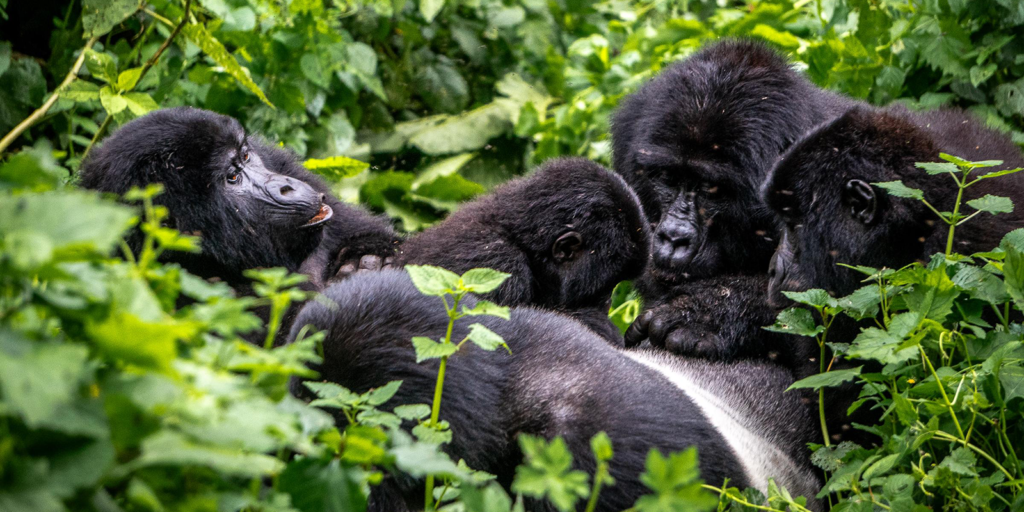
Bwindi Impenetrable National Park
Bwindi Impenetrable National Park, located in southwestern Uganda, is a UNESCO World Heritage Site known for its dense rainforest and incredible biodiversity.
View Details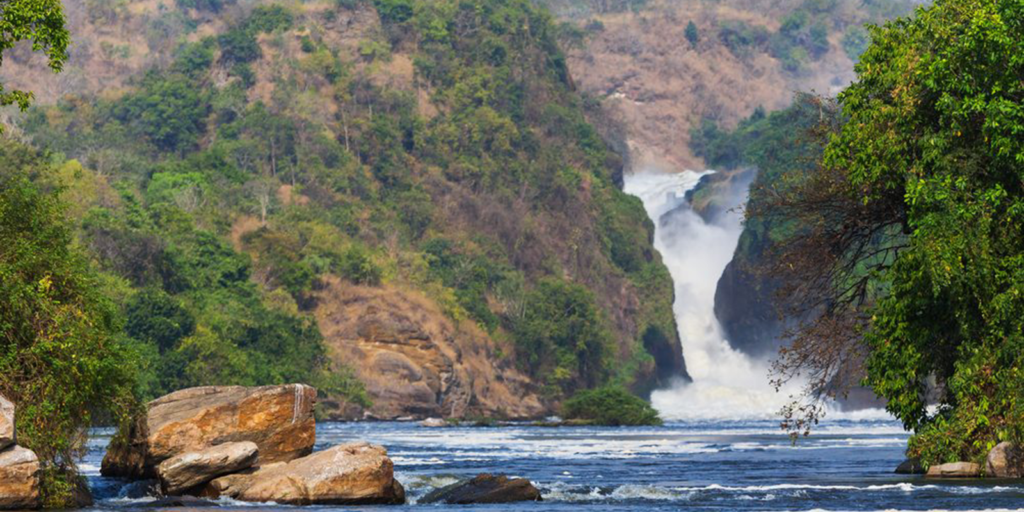
Murchison Falls National Park
The park is home to a rich variety of wildlife, including elephants, lions, leopards, giraffes, and buffaloes, along with the iconic Nile crocodiles and hippos found along the riverbanks.
View Details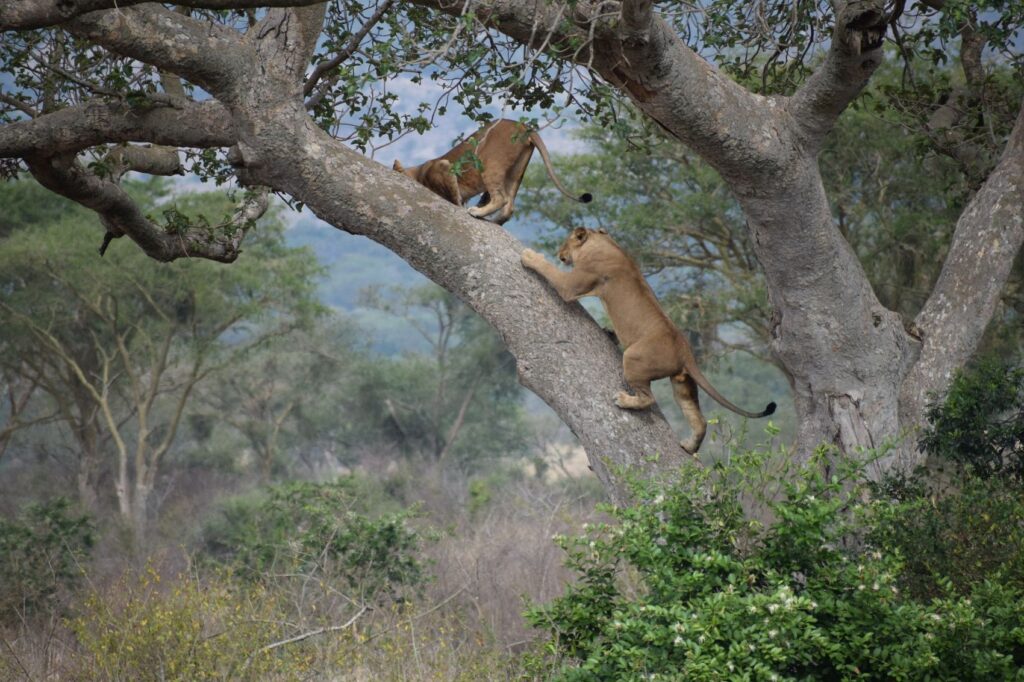
Queen Elizabeth National Park
Queen Elizabeth National Park, one of Uganda's most famous wildlife reserves, spans over 1,978 square kilometers and is nestled in the western region of the country.
View Details